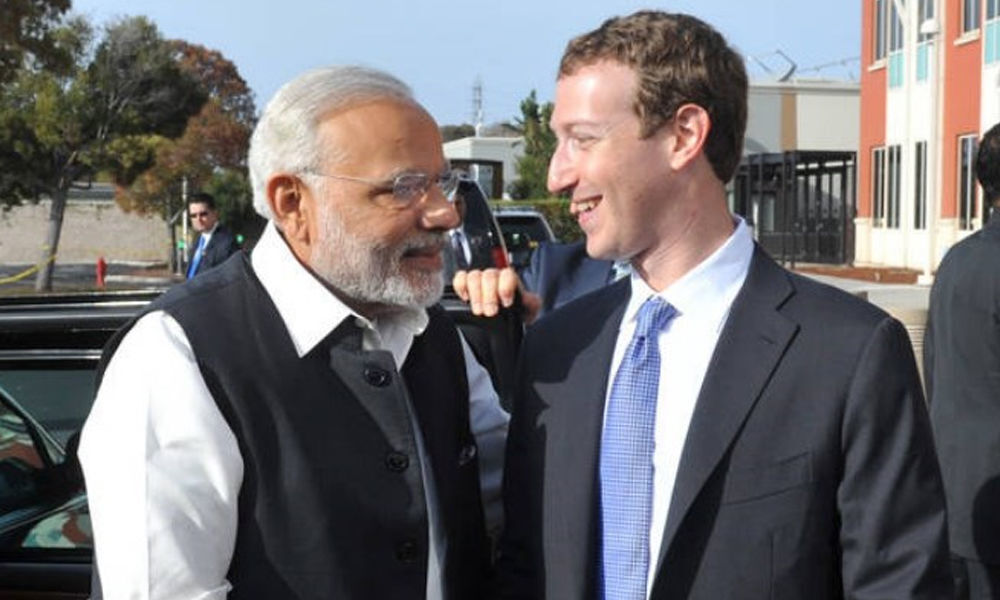Live
- Sharad Pawar makes a soul-stirring plea 'to regain the glory of progressive Maharashtra'
- Seven soldiers killed in attack on Pak military camp in Balochistan
- ICC announces 2025 Men’s Champions Trophy tour to begin in Islamabad
- Americans increasingly vote along class lines, not racial ones: Report
- Chandrababu's brother Rammurthy Naidu Passes Away in Hyderabad
- Russia restricts enriched uranium exports to US
- South African President orders immediate closure of tuck shops linked to food poisoning cases
- Study explains mechanisms behind food poisoning, gut infections
- Telangana residential school student commits suicide
- Cases of 'walking pneumonia' rise in US capital, joining national trend
Just In
The Indian election might be Facebook's last chance to prove its credibility


1.Ahead of the general elections in India Facebook plans to set up a ‘war room’ to monitor user activity. 2.If Facebook faces another data breach, it may lose its credibility altogether. 3.Earlier it set up similar war rooms ahead of the US-midterm elections and the Brazil elections
The coming up elections in India might be Facebook's last chance to prove its credibility in the market not only locally, but globally too. Facebook is planning to set up a 'war room' to examine all election content.
Shivnath Thukral, the Director of public policy in India and South Asia for Facebook told, "The operations centre in Delhi will coordinate with Facebook's offices in Menlo Park, Dublin and Singapore in order to ensure round-the-clock monitoring of misinformation."
With around 300 million active users on a monthly basis, Facebook has a huge stake in the Indian market to lose credibility. Another scandal like Cambridge Analytica (CA), where the data of 87 million users were harvested and then used to meddle in the US elections by helping Russia spread fake news in a country that consists of its largest user base may not be something that Facebook can recuperate from.
More than half a million users were 'potentially affected' in India also by the CA-Facebook data breach. Christopher Wylie, the former CA employee who blew the scandal wide open, also disclosed that SCL — CA's parent company — has worked on at least eight projects in India.
Since WhatsApp and Instagram also fall under its purview, Facebook is more worried. As reported the political parties like Bharatiya Janata Party (BJP) and Congress have formed 50,000 WhatsApp groups those are part of their campaigning. WhatsApp came under fire from the Indian government in 2018, after fake news circulated on the messaging platform led to several mob-lynchings in India.
However, the exact impact and influence of online platforms and digital tools are still under debate. As per a report, the Internet Mobile Association of India said that social media only had the ability to influence 3-4% of urban votes. Others argue that even though social media is definitely a heavy influence, it's not a decisive factor. This is different from the US, where the majority of people get to know news through social media networks like Facebook.
The US Model
The previous year, ahead of the US midterm and Brazil elections, Facebook set up 'war rooms' that eventually shut down in late November once the elections were over. Facebook indicated that it may start new war rooms for the coming elections in other countries around the world.
The previous war rooms were makeshift control centres, which Facebook claimed were a part of its effort to counter the spread of misinformation and fake news on the platform. It basically brings its employees from different teams together so that disturbing trends in user activity can be identified quickly.
When it comes to US elections, Facebook's response team coordinated response to a tip given to them by the Federal Bureau of Investigation (FBI) that specified the threat of Russian activity before the midterms. Such situations would've taken longer to address, without a war room.
To look into the practices of social networking sites ahead of the elections in the country, the Indian government has set up their own parliamentary committee. Ajit Mohan, the India public policy director, met with them last Friday where the country was issued a 10-day deadline to respond to the committee's concerns.
On February 26, a similar deadline was given to Twitter after their meeting.
The committee's concern is that Facebook is a 'hybrid' company which consists of Instagram and WhatsApp, it does not have a clear regulatory framework which applies to all of their content, advertising and marketing operations across the platforms.
Facebook was also asked about its global lobbying practices against data privacy laws after the Center of Accountability and Systematic Change (CASC) wrote a letter to the committee to address the issue.
Facebook has a political ad library where advertisers are listed according to their expenditure and the number of ads issued. The library reflects whether the ads went out with or without a disclaimer. Facebook's efforts also include on-ground vetting of advertisers, bringing in two new disclaimer categories, and adding five new partners to its third-party fact-checking initiative.
As it's market share is already on the downtrend, Facebook has to stay alert.
The users got dropped from 76% to 66% from December 2017 to December 2018, it's the largest drop being from the US.
Facebook's war room can't be a 'publicity stunt' just ahead of 2019 general elections in India. It should keep control of the bad situation from getting worse. To maintain their credibility in their largest market they'll have to walk the walk and talk the talk in order.

© 2024 Hyderabad Media House Limited/The Hans India. All rights reserved. Powered by hocalwire.com






